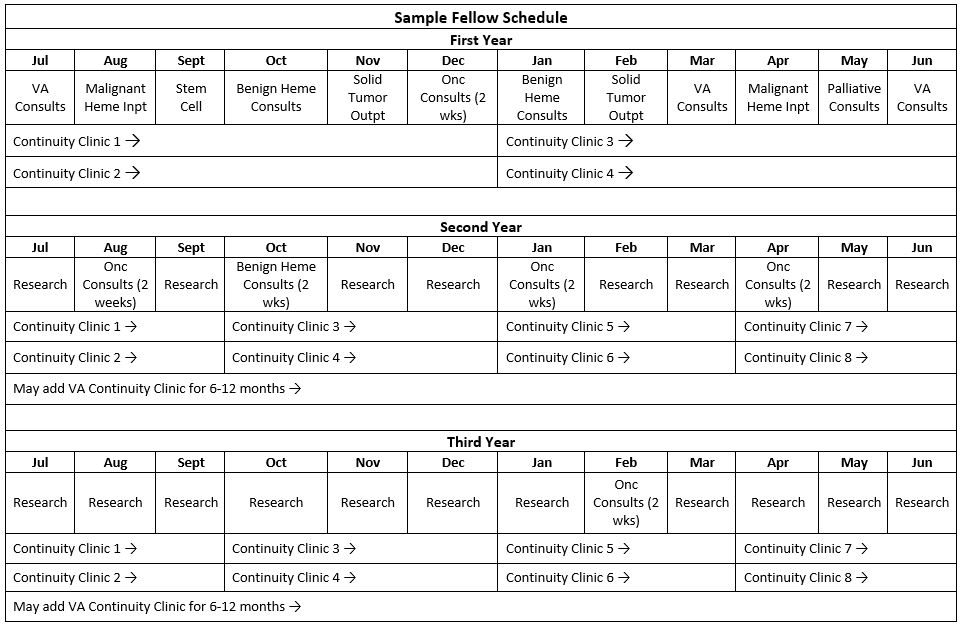Fellowship Clinical Experience
During the 18-24 months of clinical training, Hematology and Medical Oncology fellows rotate through seven major clinical services.
Northwestern Memorial Hospital
Malignant Hematology Service (Inpatient): Fellows spend 2-3 months during their first year learning the inpatient management of acute leukemia, aggressive lymphomas and other diseases within malignant hematology. Fellows round with the inpatient attending, interface with outpatient leukemia and lymphoma faculty to guide management within the longitudinal care plan, perform bone marrow biopsies and write chemotherapy orders. The service is staffed by internal medicine residents and interns, so fellow do not write notes or place basic orders.
Benign Hematology Consult Service (Inpatient): Fellows spend 3-4 months across the three years of fellowship on the inpatient benign hematology consult service with a benign hematology attending. Fellows are consulted on a wide range of cases (thrombocytopenia, thrombosis, coagulopathies, hemophilias) from medical, surgical and critical care services. There are often internal medicine residents on this rotation as well.
Oncology Consult Service (Inpatient): Fellows rotate on the oncology consult service for approximately 2-3 months across the three years of fellowship. They round with an inpatient oncology attending seeing a wide range of new diagnoses of cancer, patients wishing to transfer their care or get a second opinion, or established patients who are admitted for complications of their cancer or treatment.
Inpatient Stem Cell Transplant Service (Inpatient): Fellows rotate for 1 month on the stem cell transplant service during the first year, often 1-2 months after rotating on the malignant hematology service to allow for continuity of care and education for patients who move on to transplant. Fellows round with the stem cell transplant attending and several nurse practitioners. Fellows are the primary physician for ~4 patients (write notes, place orders) and can tailor their experience by choosing a variety of allogeneic and autologous transplant patients to follow. Northwestern averages over 350 transplants annually.
Solid Tumor Oncology Rotation within the Robert H. Lurie Comprehensive Cancer Center (Outpatient): This one-month rotation during the first year exposes fellows to 5 outpatient solid tumor oncology clinics per week in addition to their 2 continuity clinics. They cover core areas, including GI oncology, breast cancer, thoracic oncology and GU oncology.
Palliative Care Service (Inpatient): First-year fellows rotate for 1 month on the inpatient palliative care service. Fellows learn optimal symptom management, pain control and can practice breaking bad news and goals of care discussions with guidance from palliative medicine faculty.
Jesse Brown VA Medical Center
Inpatient Hematology and Oncology Consult Service: First year fellows rotate for 2-3 months on the inpatient hematology and oncology consult service at Jesse Brown VA with 2 fellows from University of Illinois Chicago. They see a wide variety of new diagnoses of cancer, patients admitted for planned chemotherapy and benign hematologic issues. They also spend 2 half-days in outpatient clinics seeing the new outpatient consults to maximize learning and exposure.
In addition to these services, each fellow maintains two outpatient continuity clinics within the Robert H. Lurie Comprehensive Cancer Center and can add a VA continuity clinic in their second and/or third year of fellowship for more autonomy and broad clinical exposure. Fellows can also rotate with Hematopathology, Transfusion Medicine, Radiation Oncology or spend additional time on the Stem Cell Transplant Service as an elective based on their interest.
Each clinical experience works together to ensure that trainees are exposed to a wide variety of hematologic and oncologic diseases to prepare for the intensive, mentored immersion in clinical or basic/translational investigation.
